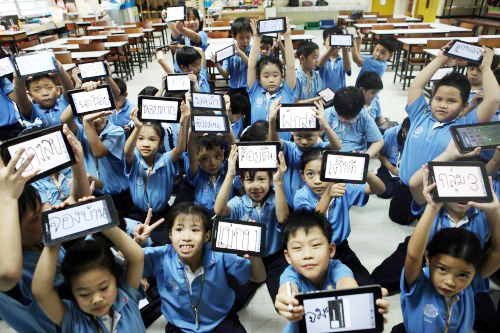It covers sex education and changing bodies, keeping in mind cultural sensitivities.
‘Today we are going to talk about becoming a big girl. Who here has
become one?’ Sinu Joseph, a social worker, said to about 50 squirming 13- and 14-year-old girls earlier this month during a visit to Renuka, a tiny government school in Bangalore. Predictably, there were giggles, groans and whispering. But when that
subsided, nearly everybody raised a hand.
The girls were getting ready to watch a pioneering animated video titled ‘Mythri’ (‘Friend’ in Sanskrit), a comprehensive guide to menstruation, a topic that is often avoided in Indian households. The 23-minute video was made in 2010, based on feedback from girls, parents and teachers in government schools across the southwestern state of Karnataka, after Ms Joseph found existing materials were too graphic, too technical or just too depressing.
“We were given Unicef handouts to take around tribal areas, with naked pictures of boys and girls to teach menstruation and sex education,” said Ms Joseph, 31. “None of the teachers would use them because they were too embarrassed. Other material focused way too much on the suffering of women, scaring the girls away.”
‘Mythri,’ which features a teacher who addresses a classroom of girls, explains in the state language of Kannada why menstruation happens as well as how often to change a sanitary napkin. It keeps cultural sensitivities in mind by only showing fully clothed girls, and yet covers sex education and changing bodies.
Through the video, Ms Joseph wanted to jettison the baggage of shame that came with talking about menstruation. “Nobody would talk about the details of it at all, because they were too shy,” she said. “The teachers would say things like ‘This is a curse you have to bear.’ No wonder the girls were so depressed about menstruating.”
‘Mythri’ has been shown to nearly 5,000 girls already in Karnataka, and the state government recently agreed to show it in all government schools, hoping to reach an estimated 2.2 million adolescent girls. The principal of Renuka had invited Ms Joseph to screen the video and conduct a question-and-answer session afterwards. After the video was shown, the questions came fast and furious. “Why do only girls get their periods? Is it because the blood of boys is purer?” asked one gawky teenager with pigtails. “If a boy touches my arm, will I get pregnant?” asked another, worriedly.
Ms Joseph, who took the queries with no hint of embarrassment, was more like a stand-up comic than a teacher, with no hint of embarrassment. There was much joking, bantering and goodhearted teasing. “When did you get your first period?” she asked a shy 13-year-old girl. “On Jan 26,” the girl stammered. “Wow, Republic Day, what a great day to get it!” Ms Joseph said, laughing. “Let’s hope the rest of you get it on Independence Day.”
At another point, she talked about how she had been convinced she had mortally injured herself when she got her period at age 11. “Nobody told me anything about it before, so I shouted, ‘Help, I have hurt myself!’ Then my sister asked if she should get me a Band-Aid,” Ms Joseph said.
A serious subject
The girls erupted into giggles at everything she said, but behind Ms Joseph’s practiced patter was a serious subject. India has the highest number of deaths from cervical cancer in the world, and one of the contributing factors is poor menstrual hygiene.
Women in rural areas use cloth during their periods, which are fine if used properly, but the women often do not change and wash the clothes regularly. Even those who have switched to sanitary napkins often do not know that they need to be changed regularly.
Ms Joseph said women needed to laugh at menstruation and at themselves. “Girls will respond to your tone,” she said. “If I am embarrassed, the girls will be, too. If I laugh and treat it as normal, so will they, and see it as normal.”
Girls in India are taught to think about menstruation — and their bodies — as impure. The girls at the Bangalore school aren’t any different.
When Ms Joseph asked them, “Is menstrual blood bad?,” most of them yelled “Yes!” “No, it’s not,” Ms Joseph said, before proceeding to explain the function of menstruation.
A girl asked why she is considered “dirty” and not allowed to go to the temple when she has periods. “In olden times, girls did not have sanitary napkins and could not keep themselves clean,” Ms Joseph said. “Now, you can. Listen to your parents now, but when you have girls of your own, let them go where they want to.”
Ms Joseph’s post-video sessions also include discussions about sex, rape and sexual abuse. She also explains the difference between a “bad touch” and a “good touch.”
“What will you do if a man touches you?” she asked the girls. “Hit him with my chappal,” was the response from one girl, referring to her sandal. “No,” said Ms Joseph, who then instructed them to scream loudly, leave the house, go for help and report it to the police. The class began practicing their screams at once.
“Don’t let anyone touch you, or talk to you improperly, but if they do, it’s not your fault,” Ms Joseph said.
Meanwhile, both teachers and parents have welcomed the video. “In these times, sexual abuse is happening all around us, even at home,” said Bhagya, a teacher at the school who goes by only one name. “Girls should know about their bodies. I would have been embarrassed to teach them myself.”
The success of the video in Karnataka has led to the central government asking Ms Joseph to write a chapter on menstruation in a textbook for girls in the sixth standard, or 12- to 13-year-olds, in several languages for other states. Next, she plans to make a Hindi-language version of ‘Mythri’ for schools in northern India.
The girls at the Bangalore school said ‘Mythri’ had taught them a great deal. “I didn’t know I had to change pads so often,” said Aishwarya, 13, who goes by one name. “We were so shy to talk about this before; now we are not.” Lavanya, 14, added that she “often wondered why boys didn’t have periods. Or why we needed to suffer. Now I know.”



